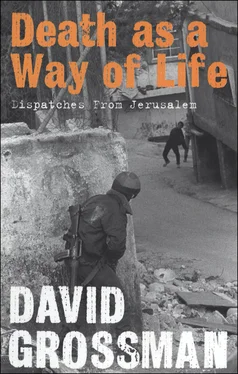David Grossman - Death as a Way of Life
Здесь есть возможность читать онлайн «David Grossman - Death as a Way of Life» весь текст электронной книги совершенно бесплатно (целиком полную версию без сокращений). В некоторых случаях можно слушать аудио, скачать через торрент в формате fb2 и присутствует краткое содержание. Год выпуска: 2013, Издательство: Bloomsbury Publishing, Жанр: Прочая документальная литература, на английском языке. Описание произведения, (предисловие) а так же отзывы посетителей доступны на портале библиотеки ЛибКат.
- Название:Death as a Way of Life
- Автор:
- Издательство:Bloomsbury Publishing
- Жанр:
- Год:2013
- ISBN:нет данных
- Рейтинг книги:5 / 5. Голосов: 1
-
Избранное:Добавить в избранное
- Отзывы:
-
Ваша оценка:
- 100
- 1
- 2
- 3
- 4
- 5
Death as a Way of Life: краткое содержание, описание и аннотация
Предлагаем к чтению аннотацию, описание, краткое содержание или предисловие (зависит от того, что написал сам автор книги «Death as a Way of Life»). Если вы не нашли необходимую информацию о книге — напишите в комментариях, мы постараемся отыскать её.
Death as a Way of Life — читать онлайн бесплатно полную книгу (весь текст) целиком
Ниже представлен текст книги, разбитый по страницам. Система сохранения места последней прочитанной страницы, позволяет с удобством читать онлайн бесплатно книгу «Death as a Way of Life», без необходимости каждый раз заново искать на чём Вы остановились. Поставьте закладку, и сможете в любой момент перейти на страницу, на которой закончили чтение.
Интервал:
Закладка:
If, on the other hand, an Arab majority rules and legislates in Israel, it will be able — by the most democratic of means — to eradicate the state’s Jewish character, to rescind its status as a land of refuge for the Jews of the world, and thus merge it with its sister Palestinian state. And is it possible to eliminate completely the ever-present threat of Arab propaganda from outside Israel, according to which every Jew who was not born in this country, or whose parents were not born here, will be forced to return to their country of origin?
I’m sorry, but no thanks. I don’t want to be part of a Jewish minority in Israel. This, keep in mind, is the only country in the world that was established by decision of the United Nations, so that the Jewish people would no longer suffer from the anomaly of being a stateless minority dependent on the mercy of others. And I can only agree with Professor Edward Said, who responded quite honestly in a recent interview in the Israeli newspaper Ha’aretz to the question of whether a Jewish minority in a Palestinian state would be equally and fairly treated. “It worries me a great deal. The question of what is going to be the fate of the Jews is very difficult for me. I really don’t know. It worries me.”
I believe with all my heart that the Israelis and the Palestinians can maintain good neighborly relations and heal the wounds that they have inflicted on one another in the past. But I also know, soberly and painfully, that this requires much time. If we can gradually heal the wounds of our wars, we will be able, in the future, to reach a situation in which, perhaps, national definitions will soften a bit and even borders will be no more than a formal line on a map. Perhaps then Israelis and Palestinians, who are much like each other in their natures and passions and, I also believe, pragmatism, will be able to mingle with each other naturally and normally. When that time comes, they will be able to live among each other, in Israel and Palestine, and serve as models of coexistence. In the meantime, we must make do with repairing what can be repaired, healing what can be healed, and trying to achieve a partial justice for both sides rather than absolute justice for either. Then we can finally set out on a new life for all.
Hours Before the Elections
February 2001
Prime Minister Barak resigned from office on December 9, 2000, following a long struggle to maintain his coalition government. His pro-peace position was weakened by a growing support for the right-wing parties that called for exercising greater military force in repressing the Intifada. Ariel Sharon, leader of the Likud Party and a former general as well, promised voters in his campaign both peace and security. After months of terrorist attacks and dozens of Israeli victims, this is what the Israeli public was yearning for. Israel was about to vote for a new prime minister. There was no doubt as to the outcome of these elections.
Today I ran into a reservist who served with me in the Lebanon War. Children were born to both of us back then. He sighed as we spoke. In 1982 Ariel Sharon led us into a trap in Lebanon. How awful it is to think that the children born to us then are the soldiers that he will lead tomorrow, should he win.
There you have it, the whole story: Sharon remains; only the soldiers change.
Sharon’s misconduct in that war led a national commission of inquiry to disqualify him from ever serving as minister of defense. In any properly run country he would have left public life and shut himself up at home. But in the Israeli political system one of the surest ways to success is to collect a large number of failures (and that will, apparently, be Ehud Barak’s only hope after tomorrow).
A non-Israeli may have trouble understanding the secret of Sharon’s seduction of the Israeli public. But the average Israeli perceives Sharon as a “strong man” who has spent his entire life fighting the Arabs and has had the courage to face them down. Over a period of more than fifty years, Sharon has had a part in every important military and political campaign, and in many respects he is, for Israelis, one of the last living Sabra heroes, the native-born Israeli who is daring, rooted in the land, and prepared to fight for it to the death. In both his appearance and character he reminds many of a biblical figure — a man of great physical prowess and primal urges, cunning, shrewd, and brave.
On the other side stands Barak. Until he became prime minister, he was considered Israel’s most courageous soldier. But now he is considered a man who lost his determination and nerve, groveling before the Palestinians, agreeing to all their demands. To most Israelis, Barak has been willing, in exchange for a tenuous chance at achieving an ambiguous peace, to abandon Judaism’s most holy sites and Israel’s strategic assets.
Sharon’s plan is astonishing in its simplemindedness and illogic. He declares that he will not evacuate even the tiniest settlement in the territories. He announces that, as far as he is concerned, “compromise” means a willingness not to reoccupy the territories that have already been handed over to the Palestinian Authority. Yet, on top of all this, he promises Israel a “secure peace.” Apparently, most Israelis long to believe him, and will, most likely, vote for him.
On second thought, this is no surprise, as Palestinians are murdering Israeli civilians almost daily. The average Israeli, who knows nothing about Palestinian suffering or losses, is certain that the Palestinians are only squeezing more and more concessions out of Israel, with their ultimate goal being not compromise but the destruction of Israel.
So when Sharon comes along and promises that he’s got a solution, the despairing Israeli prefers to believe him rather than to come to terms with the fact that the present path, the frustrating path of negotiation, with its painful compromises, is the only path we have that can lead to peace.
Sharon is selling Israelis a miracle cure — he says he won’t negotiate under fire. “If they shoot, we don’t talk.” To put it in simple language, Sharon is prepared to place the future of the peace process, Israel’s future, the future of the entire region, in the hands of every fifteen-year-old boy from Nablus or the Deheisheh refugee camp who’s got a Molotov cocktail hidden behind his back. Because if they shoot, we don’t talk.
Sharon promises, with absolute certainty, to “wipe out terrorism.” Despite his decades of run-ins with terror, he has still not learned that it can’t be obliterated by military means alone. One can certainly not wipe out the struggle of a nation with a solid national consciousness, motivation, and both great hope and great despair.
Do any of Sharon’s supporters really believe that he will have any more room for maneuver than Barak has had? Can anyone today seriously believe that Israel will always be able to do whatever it pleases in the Middle East, without paying a terrible price for it? Will Israel always enjoy American support for realizing its belligerent fantasies? Will there eternally be enough Israelis to follow their leaders into more wars that could have been prevented?
This writer has much criticism to level against Ehud Barak. Against the way he acted, his style of interpersonal relations, his tactlessness toward both those close to him and his enemies. But I am certain of one thing: it would have been impossible to lay one’s hand directly on the deepest part of the Israeli-Palestinian wound — as Barak did — without causing an eruption of the kind that has occurred. It couldn’t have been done without awakening all the most primal fears, instincts, insults, and loathing, without shaking the cratons on which the two peoples, the Israeli and the Palestinian, live.
Читать дальшеИнтервал:
Закладка:
Похожие книги на «Death as a Way of Life»
Представляем Вашему вниманию похожие книги на «Death as a Way of Life» списком для выбора. Мы отобрали схожую по названию и смыслу литературу в надежде предоставить читателям больше вариантов отыскать новые, интересные, ещё непрочитанные произведения.
Обсуждение, отзывы о книге «Death as a Way of Life» и просто собственные мнения читателей. Оставьте ваши комментарии, напишите, что Вы думаете о произведении, его смысле или главных героях. Укажите что конкретно понравилось, а что нет, и почему Вы так считаете.












